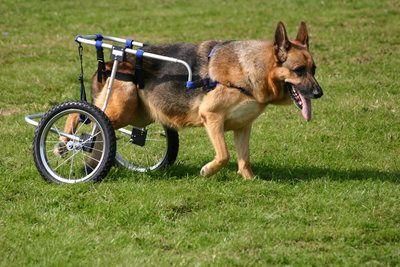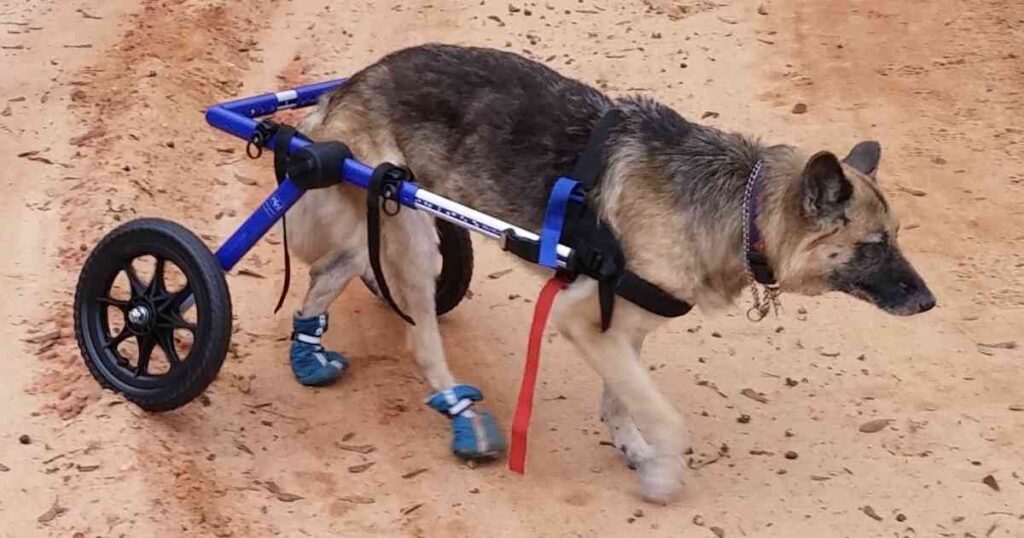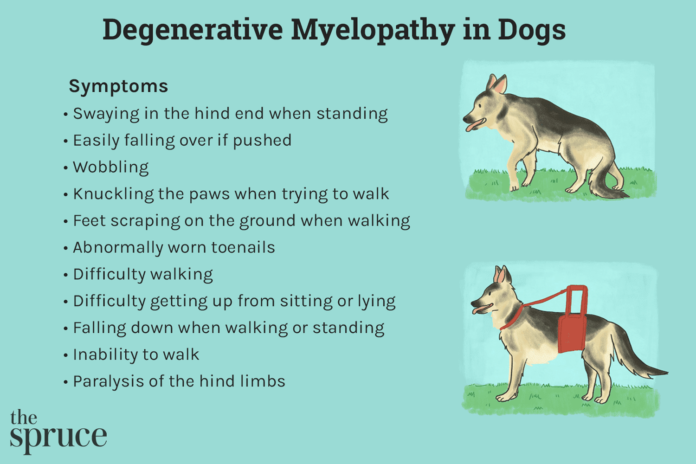Degenerative Myelopathy (DM) is a progressive neurological condition that primarily affects older dogs, leading to a decline in mobility and overall quality of life. As a pet owner, understanding this disease is essential for providing the best care possible. In this blog post, we’ll explore the various aspects of Degenerative Myelopathy, including its symptoms, the importance of early detection, types of supportive products available, and expert recommendations for managing the condition. Whether you’re facing this challenge now or seeking to be prepared, this guide will equip you with the knowledge needed to help your furry friend thrive.
What is Degenerative Myelopathy?
Degenerative Myelopathy (DM) is a progressive neurological condition primarily affecting older dogs, although it can also occur in other animals. This disease results from the degeneration of the spinal cord, particularly the part responsible for hind limb movement. It is often compared to amyotrophic lateral sclerosis (ALS) in humans.
The exact cause of Degenerative Myelopathy remains unclear, but genetic factors are believed to play a significant role, particularly in certain breeds like German Shepherds, Pembroke Welsh Corgis, and Boxers. Symptoms typically begin with subtle signs of weakness in the hind legs, leading to difficulty walking, dragging of the back paws, and eventual paralysis.

As the disease progresses, affected pets may also experience loss of coordination and an altered gait. While Degenerative Myelopathy is not painful, it significantly impacts the quality of life for both pets and their owners. Early diagnosis is crucial for managing the condition and improving mobility through appropriate interventions. If you notice signs of weakness in your dog, consult a veterinarian to discuss the possibility of Degenerative Myelopathy and explore available treatment options.
Importance of Early Detection
Early detection of Degenerative Myelopathy (DM) is crucial for effective management and support. As this progressive condition affects the spinal cord, recognizing the initial signs can lead to timely interventions that may enhance your pet’s quality of life. Common early symptoms include subtle changes in gait, such as wobbliness or difficulty getting up, which pet owners might overlook.
Identifying Degenerative Myelopathy at an early stage allows for better planning and adaptation of your pet’s environment. This may include the use of mobility aids, nutritional supplements, or physical therapy, all aimed at maintaining mobility for as long as possible. Furthermore, an early diagnosis enables pet owners to seek advice from veterinarians, who can provide tailored care options and support resources.
Additionally, early detection helps in differentiating DM from other neurological disorders that may present similar symptoms. This distinction is vital for ensuring that your pet receives the appropriate treatment and care. Ultimately, being proactive about your pet’s health can lead to improved outcomes and a more fulfilling life despite the challenges posed by Degenerative Myelopathy. Regular veterinary check-ups and attentiveness to behavioral changes are key to ensuring early detection.
Types of Products Available
When managing Degenerative Myelopathy (DM) in pets, a variety of products can help enhance mobility and improve overall quality of life. These products are designed to support dogs as they face the challenges of this progressive condition.
- Mobility Aids: Wheelchairs and harnesses are essential for helping dogs maintain mobility. They allow pets to move around more freely, providing support for their hind legs.
- Nutritional Supplements: Supplements like Omega-3 fatty acids, antioxidants, and joint support formulas can play a role in promoting overall health and potentially slowing disease progression.
- Therapeutic Tools: Items such as massage tools and physical therapy equipment can assist in maintaining muscle strength and mobility, offering comfort and aiding rehabilitation.
- Home Modifications: Ramps and non-slip mats help create a safer living environment, reducing the risk of falls and injuries.
- Veterinary Care Options: Traditional and alternative therapies, such as acupuncture and chiropractic care, can provide additional support for dogs with DM.
- Monitoring Devices: Health monitors and GPS trackers help owners keep track of their pet’s activity levels and well-being.
By utilizing these products, pet owners can better manage the impacts of Degenerative Myelopathy and improve their pets’ daily lives.
Category Comparisons
When dealing with Degenerative Myelopathy (DM), it’s essential to explore various product categories to find the best support for your pet. Here’s a comparison of key categories that can help in managing the condition.
Mobility Aids
Wheelchairs and support harnesses are vital for dogs with DM, offering stability and allowing them to move more easily. These products come in different sizes and designs, catering to various needs.

Nutritional Supplements
Supplements rich in Omega-3 fatty acids and antioxidants can help support neurological health and joint function. Choosing high-quality products can make a significant difference in your pet’s overall well-being.
Therapeutic Tools
Physical therapy equipment, such as balance boards and massage tools, can help maintain muscle strength and promote mobility. Regular use can enhance comfort and slow down the progression of DM.
Home Modifications
Ramps and non-slip mats create a safer environment for dogs struggling with mobility. These modifications can prevent accidents and ensure your pet navigates the home with ease.
Veterinary Care Options
A combination of traditional and alternative therapies, like acupuncture or hydrotherapy, can provide additional support and pain relief.
By evaluating these categories, pet owners can choose the most effective products to manage Degenerative Myelopathy and improve their furry friends’ quality of life.
Real-Life Case Studies
Real-life case studies can offer valuable insights into managing Degenerative Myelopathy (DM) in pets. These stories highlight how various interventions can make a significant difference in the lives of affected dogs and their owners.
Case Study 1: Max the German Shepherd
Max was diagnosed with DM at age eight. His owner noticed gradual weakness in his hind legs, leading to mobility challenges. After consultation with a veterinarian, they opted for a custom wheelchair to support his mobility. Alongside this, they introduced Omega-3 supplements to help maintain his overall health. With these adjustments, Max continued to enjoy his daily walks and playtime in the yard, enhancing his quality of life.
Case Study 2: Bella the Corgi
Bella, a Pembroke Welsh Corgi, exhibited early signs of DM, including wobbly gait and difficulty climbing stairs. Her owner implemented home modifications, such as ramps and non-slip mats, to improve safety. They also incorporated regular physical therapy sessions and massage into Bella’s routine. These proactive measures helped Bella remain active and comfortable as she adjusted to her condition.
These case studies illustrate the importance of early detection and the variety of products available to support dogs with Degenerative Myelopathy, ultimately improving their well-being and enhancing their owners’ peace of mind.
Expert Recommendations
Veterinarians and pet care specialists play a crucial role in managing Degenerative Myelopathy (DM). Their insights can help pet owners navigate this challenging condition effectively. Here are some key recommendations from experts:
- Early Diagnosis: Veterinarians emphasize the importance of recognizing early signs of DM, such as hind limb weakness or difficulty standing. Early detection allows for timely interventions, which can significantly improve quality of life.
- Customized Mobility Aids: Experts recommend investing in tailored mobility aids, like wheelchairs or supportive harnesses, to help maintain your pet’s independence. These aids can be adjusted as the condition progresses, ensuring continued support.
- Physical Therapy: Regular physical therapy is highly recommended. Techniques such as hydrotherapy and targeted exercises can help maintain muscle strength and improve mobility, slowing down the progression of DM.
- Nutritional Support: Experts advise incorporating high-quality nutritional supplements rich in Omega-3 fatty acids and antioxidants. These can support neurological health and joint function, contributing to your pet’s overall well-being.
- Emotional Support: Finally, veterinarians stress the importance of emotional support. Spend quality time with your pet, engage in gentle activities, and consider joining support groups for additional guidance and encouragement.

By following these expert recommendations, pet owners can better manage Degenerative Myelopathy and enhance their furry companions’ quality of life.
Conclusion
Managing Degenerative Myelopathy (DM) can be a challenging journey, but with the right information and resources, pet owners can significantly enhance their furry friends’ quality of life. Early detection is crucial, allowing for timely interventions and the use of effective products such as mobility aids, nutritional supplements, and therapeutic tools. Real-life case studies demonstrate the positive impact of proactive care, highlighting how tailored solutions can help dogs continue to enjoy their daily activities.
Expert recommendations further emphasize the importance of comprehensive support, from physical therapy to emotional companionship. As you navigate this condition, remember that you are not alone—many resources and communities are available to assist you. By staying informed and making thoughtful choices, you can provide your pet with the care and comfort they need while living with Degenerative Myelopathy. Embrace the journey with hope and dedication, and your bond with your pet will only grow stronger.


